SUMMARY
This is AI generated summarization, which may have errors. For context, always refer to the full article.
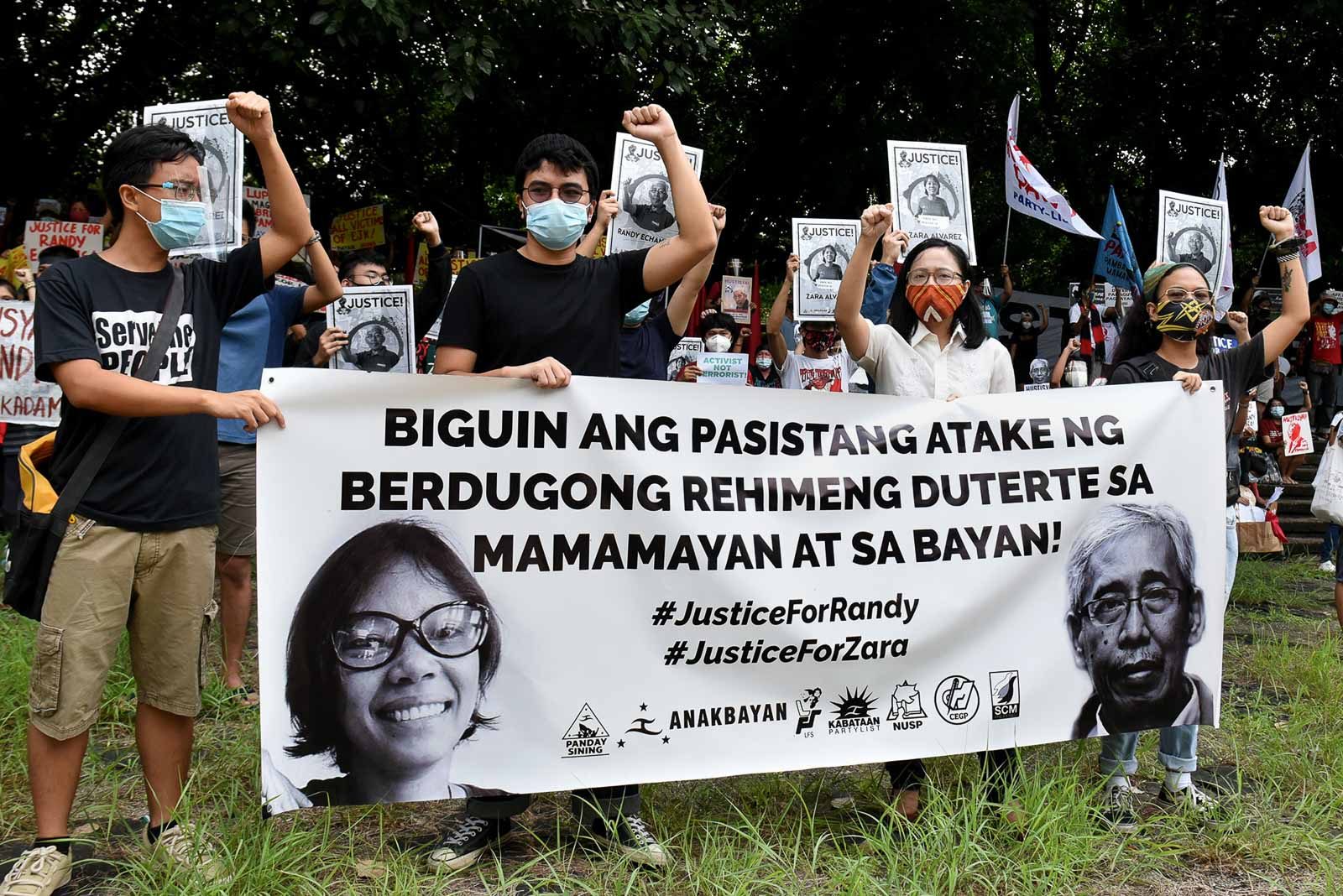
Several progressive groups trooped to Bantayog ng mga Bayani in Quezon City on Wednesday, August 19, to appeal for justice for slain activists Randy Echanis and Zara Alvarez, who were killed exactly 1 week apart.
In a protest commemorating Global Day of Action for Justice, multiple groups comprising the youth, human rights advocates, and land reform activists banded together to condemn the killings of Echanis and Alvarez and renew calls to junk the anti-terror law. Among the groups participating in the protest were Anakbayan, Kilusang Mayo Uno, and College Editors Guild of the Philippines (CEGP).
Echanis, 72, was a longtime activist and peasant leader who served as the Anakpawis chairperson and Kilusang Magbubukid ng Pilipinas deputy secretary general. He was unarmed when he was stabbed dead inside his own home in Quezon City on August 10.
Meanwhile, Alvarez, 39, was a human rights activist who worked tirelessly for the Negros Island Health Integrated Program (NIHIP) and Karapatan Negros Island. She was gunned down in Bacolod City on August 17, a week since the murder of Echanis.
‘Dissent has become a crime’
The deaths of both Echanis and Alvarez came only a month after President Rodrigo Duterte signed the anti-terror law, which critics feared gave the government more power to arrest or detain dissenting individuals and groups due to the policy’s vague definition of terrorism.
They are the latest in the killings of activists and members of cause-oriented and progressive groups.
In a statement, CEGP Cebu said that the demise of activists such as Echanis and Alvarez emphasizes the “dire implications” of the anti-terror law, which they believe was passed to “contort the very rights of the people to speech and expression, and to sow a message of fear and intimidation to those who assert for their rights.”
“Dissent has become a crime when it should not be,” CEGP Cebu added.
Around 500 protesters from various sectors joined the Global Day of Action for Justice rally in a bid to amplify calls to junk the anti-terror law and condemn the “state-sponsored attacks,” according to Anton Narciso III, College Editors Guild of the Philippines (CEGP) national secretariat.
“With the recent brutal killings of Zara Alvarez and Randy Echanis, along with previous victims of state-sponsored attacks, Duterte’s previous pronouncements against human rights defenders have indeed legitimized its attacks through anti-terror law,” he said.
The Commission on Human Rights said in a recent report that the Duterte administration “purposely engages” in certain acts that hinder the protection of human rights defenders. They added how these manifested in profanity-laden tirades and public vilification done by President Rodrigo Duterte and his administration.
Alvarez was among the more than 600 people that the Department of Justice wanted to declare as terrorists in a proscription case filed in February 2018.
The list was trimmed down to only two – exiled Communist Party of the Philippines founding chairman Jose Maria Sison and alleged Mindanao Commission Secretary Antonio Cabanatan – in a still pending case.
Narciso said that, with the implementation of the anti-terror law, the administration’s “war against its critics makes it easier to brand dissenters as terrorists.”
“Ang mga pagpatay na ito ay walang lugar sa ating lipunan. Ang kritisismo ay hindi kailanman dapat tinatapatan ng pagpatay sa mga kritiko…Hindi po sibilisado ang ganyang ginagawa nila, ‘yan ay terorismo ng estado,” said Renato Reyes Jr., Bagong Alyansang Makabayan secretary-general during the protest action at Bantayog ng mga Bayani.
(These killings have no place in our society. Criticism should never be dealt with by killing critics. This is not a civilized response – this is terrorism of the state.)
‘State-sponsored’ killings instead of mass testing
In the Global Day of Action for Justice protest, Kabataan Partylist, headed by Kabataan Representative Sarah Elago, also condemned the Duterte administration’s interest in “sponsoring the killings of rights activists” amid concerns for stronger government efforts to curb the spread of COVID-19.
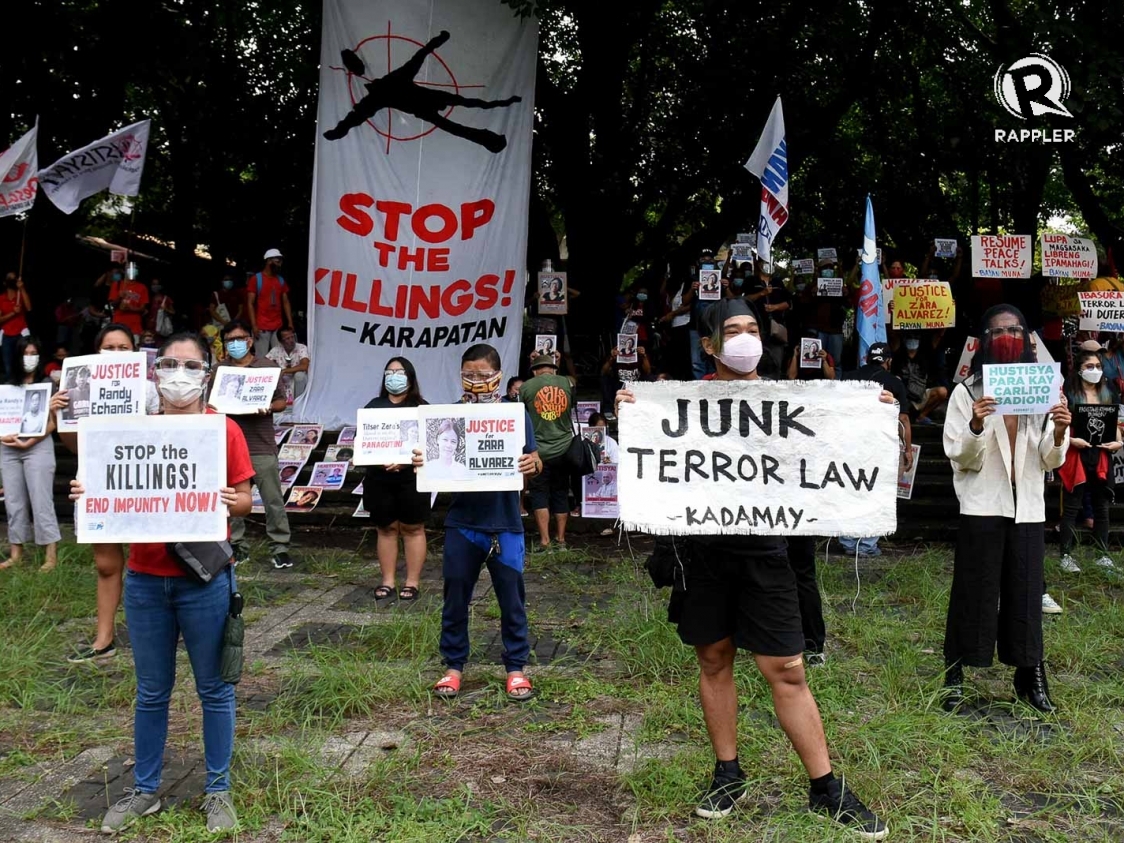
Five months have passed since the onslaught of the coronavirus pandemic, yet the country’s pandemic response arguably lags behind, as it became the Southeast Asian nation with the highest number of cases.
“Galit ang sagot ng mamamayan sa ginagawa ni Duterte! Imbis na mass testing, pagpatay sa mga lider ang kaniyang ginagawa!” said Mimi Doringo, spokesperson of urban-poor rights group Kadamay.
(The response of citizens to Duterte’s actions is anger. Instead of mass testing, he killed our leaders.)
According to a list put together by Karapatan, at least 134 human rights defenders have been killed since 2016. – Rappler.com
Add a comment
How does this make you feel?

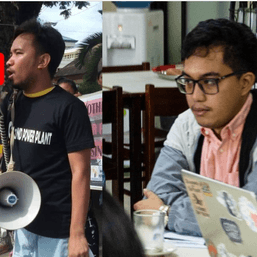
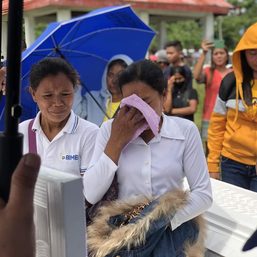
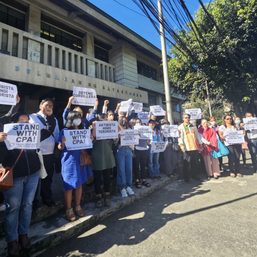
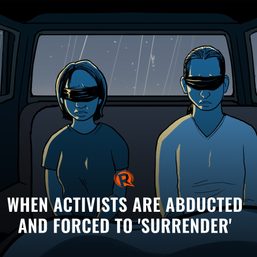
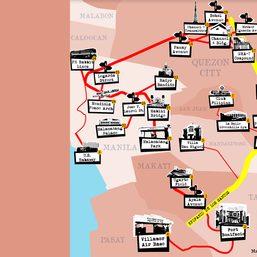
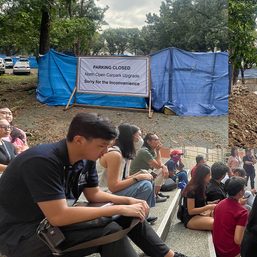
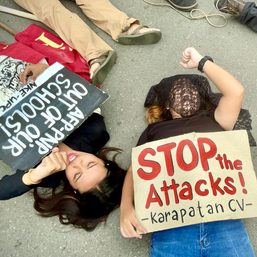
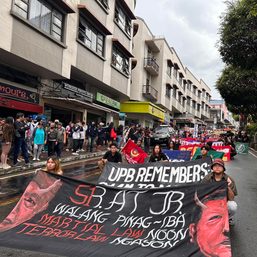
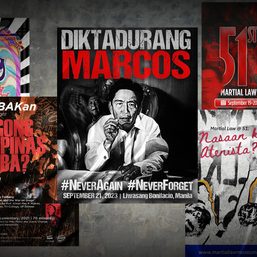
There are no comments yet. Add your comment to start the conversation.